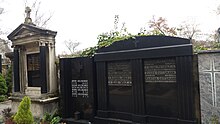Richard Wolf (Colonel)
Richard Wolf (born March 18, 1894 in Simmern / Hunsrück ; † May 9, 1972 in Nuremberg ) was a German colonel in the Wehrmacht and headed the defense of the cities of Würzburg and Nuremberg as combat commander towards the end of the Second World War .
Life
In the course of his participation as a volunteer in the First World War , Wolf was promoted to lieutenant in the reserve and only reactivated as captain of an infantry regiment in 1936 after his discharge from military service at the end of the war .
After his participation in the western campaign he was promoted to major in October 1940 and was in command of the III. Battalion of the 208 Infantry Regiment of the 79th Infantry Division has been involved in the Russian campaign since June 1941 . Richard Wolf was promoted to lieutenant colonel on April 1, 1942, and to colonel on December 1, 1942. From March 9, 1942, until his severe wounding in Stalingrad on December 23, 1942 and the subsequent escape from the boiler , he commanded the 208 Infantry Regiment. After his recovery, Richard Wolf led various brigades .

On January 20, 1943 he was awarded the Knight's Cross of the Iron Cross .
Wolf was among other things as combat commander in the defense of the cities of Würzburg (until April 5/6, 1945 against the 42nd US infantry division "Rainbow Division") and Nuremberg (since April 15, 1945) against the advancing US forces for which he received the oak leaves for the Knight's Cross of the Iron Cross . He was captured by American soldiers on the morning of April 21, 1945 after the Battle of Nuremberg , after ordering the fighting to cease on April 20.
His involvement in the defense of the two major cities in Franconia , where he earned the reputation of an unscrupulous commander, led to around 1,000 civilian and military victims in Würzburg and 700 in Nuremberg on the German side. On the US side, about 300 GIs were killed in the conquest of Würzburg and 130 in the case of Nuremberg . In other cities in Bavaria, surrendering in good time saved many lives and prevented the destruction of buildings and infrastructure.
literature
- Karl Kunze: End of the war in Franconia and the fight for Nuremberg in April 1945 (= Nuremberg research , vol. 28). Edelmann, Nuremberg 1995, ISBN 3-87191-207-7 .
- Erhard Mossack: The last days of Nuremberg. Based on a factual report from the 8 o'clock newspaper . Noris-Verlag, Nuremberg 1952 (reprint: Verlag Deuerlein, Nuremberg 2000, ISBN 3-9807486-0-X ).
Individual evidence
- ^ Karl Kunze: End of the war in Franconia and the struggle for Nuremberg in April 1945 , self-published by the Association for the History of the City of Nuremberg, 1995, p. 344 online
- ↑ Ulrich Wagner: Stadthistorische Streiflichter (32): The 7th US Army conquers Würzburg ( Memento of the original from August 30, 2012 in the Internet Archive ) Info: The archive link was automatically inserted and not yet checked. Please check the original and archive link according to the instructions and then remove this notice. ; Article on wuerzburg.de; Retrieved January 20, 2013
- ↑ Peter Weidisch: Würzburg in the "Third Reich". In: Ulrich Wagner (Hrsg.): History of the city of Würzburg. 4 volumes, Volume I-III / 2, Theiss, Stuttgart 2001-2007; III / 1–2: From the transition to Bavaria to the 21st century. 2007, ISBN 978-3-8062-1478-9 , pp. 196-289 and 1271-1290; here: p. 279.
- ↑ Ulrich Wagner: The conquest of Würzburg in April 1945. In: Ulrich Wagner (Hrsg.): History of the city of Würzburg. 4 volumes, Volume I-III / 2 (I: From the beginnings to the outbreak of the Peasant War. 2001, ISBN 3-8062-1465-4 ; II: From the Peasant War 1525 to the transition to the Kingdom of Bavaria 1814. 2004, ISBN 3 -8062-1477-8 ; III / 1–2: From the transition to Bavaria to the 21st century. 2007, ISBN 978-3-8062-1478-9 ), Theiss, Stuttgart 2001–2007, Volume III (2007), Pp. 294-314 and 1290-1292; here: pp. 295–309 ( online ).
- ^ City of Nuremberg: End of the war in Nuremberg ; ( Memento of the original from March 15, 2013 in the Internet Archive ) Info: The archive link was inserted automatically and has not yet been checked. Please check the original and archive link according to the instructions and then remove this notice. Retrieved January 20, 2013
- ↑ a b Easter 1945: The senseless struggle for Würzburg ; Article on history at Mainpost.de; Retrieved January 20, 2013.
| personal data | |
|---|---|
| SURNAME | Wolf, Richard |
| BRIEF DESCRIPTION | German officer, most recently Colonel of the Wehrmacht, combat commander of Würzburg and Nuremberg in 1945 |
| DATE OF BIRTH | March 18, 1894 |
| PLACE OF BIRTH | Simmern / Hunsrück |
| DATE OF DEATH | May 9, 1972 |
| Place of death | Nuremberg |